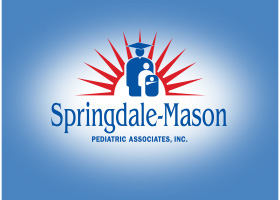Welcoming Your Newborn
Sleep
Sleep Safety
Feeding
Breastfeeding
Formula Feeding
Skin Care and Bathing
Illness and Fever
Tummy Time
Stools and Urine Output
When to Call Us
Online Resources for New Parents
More Resources

Congratulations! on the birth of your baby As you begin your journey the following guideline will help you care for your newborn.
Sleep
Day night confusion is very normal for babies in the first 2 weeks of life. They often sleep a lot during the day and have long wakeful periods at night. Unfortunately, there is no secret to correct this situation. We recommend that at night you speak quietly, minimize socializing with your baby, and keep the lights dim. By contrast during the day, let light come in through windows, speak in normal voices and socialize with your baby.
To promote healthy sleeping habits, try to lay your baby down before the baby is fully asleep. This will teach your baby to self soothe as they grow older.
Sleep Safety
Sudden infant death related to sleep is often preventable. Some of the causes of sudden infant death are suffocation, accidental entrapment, and SIDS (Sudden Infant Death Syndrome). Unfortunately, we don’t know what causes SIDS, but we do know what correlates with a reduction in the chance of SIDS.
- Back sleep–Babies should sleep on their backs. Side sleep is not recommended.
- Room sharing–Babies should sleep in their parent’s room on their own separate sleep surface (usually a crib or bassinet). This can reduce the risk of SIDS by up to 50%.
- Pacifier use—If a baby sucks on a pacifier as they fall asleep, it can reduce the chance of SIDS. This protective effect is seen even if the pacifier falls out of the baby’s mouth once the baby is asleep.
Factors that are known to increase the risk of SIDS or sudden death due to suffocation or entrapment.
- Soft items in the crib–It is best to only have the mattress with a tightly fitting sheet. There should not be anything soft in the crib or bassinet such as a pillow, cushion, sheep skin, heavy blanket, bumper pad or stuffed animal.
- Co-sleeping–Sleeping in a bed with others has been linked to higher rates of infant death. This risk further increases the person sharing the bed with the baby has consumed alcohol, other drugs or smokes cigarettes.
Feeding
Most babies initially feed 10 to 12 times per day. Until your baby has shown good weight gain, it is best not to let him go more than 4 hours between feeds. On the first couple of days you may need to wake your baby more than one time per day. However, by 3 to 5 days of age your baby should be waking up on his own to feed.
- Typically, babies feed every 2-3 hours in the first weeks of life.
- Frequent feeding in the first 3-4 days will help the mother’s milk come in quickly.
- Breast feeding mothers should eat a calcium rich diet and should continue taking their prenatal vitamins. Hydration is very important for optimal breast milk production. We recommend drinking at least 8 glasses of fluids per day.
- If you wish to offer your baby a bottle, it is best to wait until 3 weeks of age. After 3 weeks of age, breast feeding is well established, but your baby should still be flexible and will be willing to take a bottle. Offer a bottle with some regularity to keep it an option.
- Initially offer your baby 2-3 oz. of formula or breast milk.
Formula feeding
- If your home is supplied with city water, you do not need to boil the water or use bottled water to mix with formula.
- Always make formula following the directions on the can. Never give your baby diluted formula.
- Ready-to-feed opened formula can be kept in the refrigerator for 48 hours. Formula mixed from powder can be stored in the refrigerator for 24 hours.
- Babies can regulate themselves and should never be encouraged or forced to finish a bottle when they show signs that they are finished feeding.
Bottle care
Bottles and nipples should be initially boiled for 5 minutes in boiling water to remove any chemicals from the manufacturing process. Thereafter the bottles can be washed with hot soapy water or run through the dishwasher.
Never use the microwave to warm a bottle as it can heat unevenly and create hot spots. Submerge a bottle in a mug of hot water or run it under hot water to heat it. You can also use warm tap water to make the bottles. Always check the temperature of the formula or breast milk on the back of your hand before giving it to your baby.
Water
Infants do not need to water. A significant portion of formula or breast milk is water.
Vitamin D supplementation
Studies have shown that as a population, we are vitamin D deficient. Vitamin D deficiency can lead to bone issues and has been linked to asthma and immune system dysfunction. If a mother is deficient in vitamin D, an exclusively breast fed infant can become deficient as well. Therefore, we recommend that parents give all breastfed infants a vitamin D supplement orally once daily to prevent this deficiency.
There are two options to provide your baby with vitamin D. You can give your baby Vitamin D drops at a dose of 400 IU per day or the mother can take a large dose of vitamin D, 6,400 IU per day that will transfer through the breast milk to the baby.
Skin Care and Bathing
- Babies shed a layer of skin in the first 1-2 weeks of life so peeling dry skin can be normal. Any skin that appears red and cracked should be brought to the attention of your pediatrician.
- Babies should be sponge bathed until the umbilical cord has fallen off and until the circumcision has healed, if applicable.
- Avoid using soap on the baby’s body until the baby is about two weeks old. Thereafter use hypoallergenic baby soaps.
- Powder is not recommended as it can be accidentally inhaled by the baby and get into their lungs.
Illness and fever
Your baby’s immune system is relaxed as the baby’s body adjusts to breathing air and not living in water in the uterus. Therefore, we worry about illness and fever in babies fewer than 2 months old. If your baby is lethargic, irritable, not feeding well, or feels warm, measure their temperature. The most accurate way to measure the temperature is rectally (in their rear-ends). You should call our office immediately for a temperature over 100.4 degrees F.
To avoid illness under 2 months of age, it is best to limit the number of people who visit your newborn. We recommend avoiding crowded areas such as restaurants, busy stores, and airplanes. Remember that younger children can be contagious with illnesses before they show symptoms. Encourage good hand washing for anyone handling your newborn.
Tummy Time
We recommend placing babies on their stomach when they are awake. Because babies are required to sleep on their backs and they sleep a large portion of the day, it can cause some flatness of their head. In addition, babies benefit from an opportunity to exercise the back muscles. We recommend that you place your baby on their stomach when awake. Place your baby on the floor on a mat or blanket so that they have a firm surface to push off. Ideally your baby should play on their stomach and sleep on their back.
Stools and Urine Output
Your baby may have a bowel movement after each feeding or one stool every 2 to 3 days. The stools can be yellow, brown, or green. The worrisome colors are white, bright red and black like tar. If you see the worrisome colors call our office.
Constipation is defined by the hardness of the stool, not the frequency of the stool or the amount the baby strains to have the stool. It is common for babies to strain when they are passing stool. If your baby has small hard pellet stools, that is considered constipation. If this occurs repeatedly, please call our office. If your baby is eating well and urinating, don’t worry if your baby goes 3-4 days without a stool. This can be normal and is not considered constipation if the stool remains soft.
When you are breast feeding it may be difficult to know if your baby is eating enough. One way to be reassured is by the number of wet diapers your baby has. Your baby should have a minimum of 4 to 5 wet diapers in a 24-hour period.
Your baby might have a bowel movement after each feeding or one stool every 2 to 3 days. The stools can be yellow, brown or green. The worrisome colors are white, bright red, and black like tar. If you see the worrisome colors call our office.
When to Call Us
We are here to give you guidance and counseling in caring for your baby. We ask that you confine your non-urgent calls to regular daytime business hours. This is when we are fully staffed to answer your questions. You may always leave non-urgent questions on our voicemail, and we will return your call the following day.
In an emergency, you can reach us 24 hours a day through our answering service. You can dial our office number and if the office is closed press option 5 be transferred to the answering service. The doctor on-call will return you call.
Get more in-depth information about when you should call us.
Online Resources for New Parents
Child Development Institute
An excellent site for developmental information, and parenting and behavior resources.
KidsHealth Sleep and Newborns
Learn what’s normal and how to help your newborn develop healthy sleep habits.
La Leche League International
In-depth breastfeeding information and mother-to-mother support, as well as links to La Leche League organizations throughout Greater Cincinnati.
Medline Plus
In-depth information about diseases, conditions and wellness issues from the National Institutes of Health, including a guide for first-time parents.
Zero to Three
Information to help parents make the most of their babies’ critical first three years of development.
More Resources You Can Download Here
Infant and Toddler Safety Checklist
Return to Top


